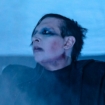For many rock fans, the name Tyler Bates only recently popped up on their radar due to his work producing, composing and performing on the ninth and 10th Marilyn Manson albums The Pale Emperor and Heaven Upside Down, and joining the shock rocker as a touring guitarist. But within the film and television industry, Bates already had a long track record and an established name by the time he linked up with Manson, after a chance encounter on the set of Californication. In fact, you can track the evolution of his career in that world right alongside the ascension of some of Hollywood's youngest, brightest directors.
Originally, Bates carved out a career as the go-to horror guy, cueing up the morbid, minor-chord dirges for Rob Zombie's The Devil's Rejects, James Gunn's Slither, and Zack Snyder's Dawn of the Dead. Those contacts paid off after Snyder called him back a few years later, when he needed someone to conduct a bloodthirsty opera fit for the chiseled delts and callow battle cries of 300, and Gunn invited him to his set in 2014, for the soon-to-be-massive Guardians of the Galaxy franchise. Today, Bates boasts one of the most impressive portfolios in the business. His latest high-profile venture is Deadpool 2, which catches the vagabond, cardinal-garbed mercenary on a brand-new killing spree with some old friends in X-Force.
We caught up with the life-long Angeleno at his studio, where he talked about the collaborative relationship between film composers and directors, the similarities between producing records and writing scores, and nailing the right kind of riff for a bad motherfucker like Cable.
YOU'VE BEEN WORKING ON FILM SCORES FOR A LONG TIME, HOW WERE YOU APPROACHED FOR THE DEADPOOL PROJECT?
TYLER BATES I had done two films already with the director David Leitch, and obviously the prospect of doing a franchise like that with a director I knew was pretty intriguing. It worked out great.
DEADPOOL IS OBVIOUSLY KNOWN FOR ITS SARDONIC, SELF-AWARE TONE. IT'S PROBABLY THE ONLY SUPERHERO FRANCHISE ON THE MARKET THAT CAN BE DESCRIBED AS A COMEDY. DID YOU TRY TO CAPTURE THAT FEELING IN THE SCORE AT ALL?
Well, actually the score for this film in particular has to be functional on a foundational level. Any extreme commitment to style will throw the humor off and diminish it. The key is to give it the energy and emotional thrust, to help the storytelling while not affecting the shoot and emotions, because the film does toggle between a more serious tone and a more humorous tone. So I think that's the thing. The trick is to stay the hell out of the way. It's not the easiest thing to do, and this movie happened pretty quickly, too. Movies tend to change form and fluctuate all the way to the end, which is definitely a challenge.
IT'S INTERESTING YOU SAY THAT, BECAUSE THE TREND IN FILM MUSIC OVER THE PAST 20 YEARS OR SO HAS BEEN THIS IDEA THAT THE SCORE NEEDS TO BE OUT OF THE WAY AND FADE INTO THE BACKGROUND. AS SOMEONE WHO MAKES MUSIC WITH MARILYN MANSON — WHICH OBVIOUSLY REQUIRES THE COMPLETE OPPOSITE TECHNIQUE — WHAT'S IT LIKE TO SHIFT YOUR BRAIN BETWEEN THOSE TWO MODES?
It's important to understand what the music is, or what the function I serve in the equation. Something as personal as doing records with Marilyn Manson at a time when we're talking about reinvention and reinvigoration is a different type of relationship, a different type of collaboration, than going into a film project that's already been conceptualized, with a director at the helm already having conversations about what the music needs to be. Now, obviously they don't take all the subjectivity off the table — I do what I do as an artist — but it's within the construct of that pre-existing property. Look at Guardians of the Galaxy — that's not going to sound at all like The Devil's Rejects or 300. You need to be in-tune with the sensibility of the storytelling, and what the goal is.
I come into every situation with an open mind. The parallel between working with someone like Manson and someone like James Gunn is similar in the sense that they both have stories to tell, and they enlist me to tell how to approach that, musically.
THE WAY YOU SAY THAT, IT ALMOST SOUNDS LIKE YOU NEED TO PUT YOUR OWN ARTISTIC EGO ASIDE A LITTLE BIT TO HELP FACILITATE EACH PROJECT.
Well, what does ego actually mean, right? Ego is something that gives you confidence enough to take on a task where there's consequence if you fail. Your ego will drive you there. If your ego is all about adulation and yourself, there's really no place for that in a film or a record. The artist is the one that has to live with the end result. I move on with my life, so it's my duty, ethically, to preserve the interest of what the artist's objective is, and the feeling they want to give the audience.
It's not to say I don't have ideas on how to do that — I absolutely do — but my impression has to come from the collaborators around me, rather than putting my own voice and my creative objective forward. Many times it's possible to write a great piece of music that's not appropriate for a film, and many times when it is, it still gets tossed. I approach everything with a sense of humility.
A LOT OF PEOPLE ENJOYED SOME OF THE LICENSED MUSIC IN THE FIRST DEADPOOL, AND I'M SURE THE SECOND MOVIE WILL HAVE SOME LICENSED MUSIC AS WELL. AS SOMEONE WHO'S SCORING THE FILM, DO YOU PAY ATTENTION TO THE LICENSED MUSIC THAT'S IN THE FINAL PRODUCT? DOES THAT HAVE ANY IMPACT ON HOW YOU WRITE?
It absolutely does. You have to be aware of it, and see how the licensed songs are impacting the scenes that they're in. Even if I'm not writing a score for those scenes, the score in the scenes before them or after them will be affected by the licensed songs. So you want to see how it resonates. The score can augment those moments, depending on what the desired effect is.
The licensed songs also tell a great deal of information to the composer of what the sensibility of the movie is. The songs in Deadpool tell me a lot about Ryan Reynolds, and the movie he is seeking to make, as well as David Leitch. It's a tricky one, because Ryan is a star of the movie, a writer and a producer. He's very much in the filmmaking aspect of the production. So it's paramount for me to understand him as best as I can. You have to be aware of that information, you have to look for it.
THE CHARACTER OF CABLE IS BEING INTRODUCED IN THIS MOVIE, WHO'S A LONGTIME PARTNER IN CRIME WITH DEADPOOL. WHAT WAS GOING THROUGH YOUR MIND MUSIC-WISE, AS FAR AS WHAT THAT CHARACTER'S THEME SHOULD SOUND LIKE.
Cable definitely as a distinct riff. It's stated in the electronic score, it's stated in the orchestral score. The sensibility of the character ... I can't get too specific, but the riff, or the motif, that's written for Cable is very specific to his physique and his weaponry.












